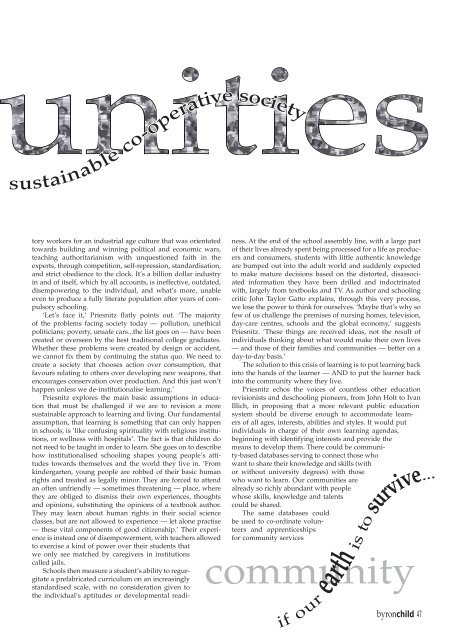byronchild - logo
byronchild - logo
byronchild - logo
Create successful ePaper yourself
Turn your PDF publications into a flip-book with our unique Google optimized e-Paper software.
society<br />
society<br />
co-operative<br />
co-operative<br />
sustainable<br />
sustainable<br />
tory workers for an industrial age culture that was orientated<br />
towards building and winning political and economic wars,<br />
teaching authoritarianism with unquestioned faith in the<br />
experts, through competition, self-repression, standardisation,<br />
and strict obedience to the clock. It’s a billion dollar industry<br />
in and of itself, which by all accounts, is ineffective, outdated,<br />
disempowering to the individual, and what’s more, unable<br />
even to produce a fully literate population after years of compulsory<br />
schooling.<br />
‘Let’s face it,’ Priesnitz flatly points out. ‘The majority<br />
of the problems facing society today — pollution, unethical<br />
politicians; poverty, unsafe cars...the list goes on — have been<br />
created or overseen by the best traditional college graduates.<br />
Whether these problems were created by design or accident,<br />
we cannot fix them by continuing the status quo. We need to<br />
create a society that chooses action over consumption, that<br />
favours relating to others over developing new weapons, that<br />
encourages conservation over production. And this just won’t<br />
happen unless we de-institutionalise learning.’<br />
Priesnitz explores the main basic assumptions in education<br />
that must be challenged if we are to revision a more<br />
sustainable approach to learning and living. Our fundamental<br />
assumption, that learning is something that can only happen<br />
in schools, is ‘like confusing spirituality with religious institutions,<br />
or wellness with hospitals’. The fact is that children do<br />
not need to be taught in order to learn. She goes on to describe<br />
how institutionalised schooling shapes young people’s attitudes<br />
towards themselves and the world they live in. ‘From<br />
kindergarten, young people are robbed of their basic human<br />
rights and treated as legally minor. They are forced to attend<br />
an often unfriendly — sometimes threatening — place, where<br />
they are obliged to dismiss their own experiences, thoughts<br />
and opinions, substituting the opinions of a textbook author.<br />
They may learn about human rights in their social science<br />
classes, but are not allowed to experience — let alone practise<br />
— these vital components of good citizenship.’ Their experience<br />
is instead one of disempowerment, with teachers allowed<br />
to exercise a kind of power over their students that<br />
we only see matched by caregivers in institutions<br />
called jails.<br />
Schools then measure a student’s ability to regurgitate<br />
a prefabricated curriculum on an increasingly<br />
standardised scale, with no consideration given to<br />
the individual’s aptitudes or developmental readi-<br />
ness. At the end of the school assembly line, with a large part<br />
of their lives already spent being processed for a life as producers<br />
and consumers, students with little authentic knowledge<br />
are bumped out into the adult world and suddenly expected<br />
to make mature decisions based on the distorted, disassociated<br />
information they have been drilled and indoctrinated<br />
with, largely from textbooks and TV. As author and schooling<br />
critic John Taylor Gatto explains, through this very process,<br />
we lose the power to think for ourselves. ‘Maybe that’s why so<br />
few of us challenge the premises of nursing homes, television,<br />
day-care centres, schools and the global economy,’ suggests<br />
Priesnitz. ‘These things are received ideas, not the result of<br />
individuals thinking about what would make their own lives<br />
— and those of their families and communities — better on a<br />
day-to-day basis.’<br />
The solution to this crisis of learning is to put learning back<br />
into the hands of the learner — AND to put the learner back<br />
into the community where they live.<br />
Priesnitz echos the voices of countless other education<br />
revisionists and deschooling pioneers, from John Holt to Ivan<br />
Illich, in proposing that a more relevant public education<br />
system should be diverse enough to accommodate learners<br />
of all ages, interests, abilities and styles. It would put<br />
individuals in charge of their own learning agendas,<br />
beginning with identifying interests and provide the<br />
means to develop them. There could be community-based<br />
databases serving to connect those who<br />
want to share their knowledge and skills (with<br />
or without university degrees) with those<br />
who want to learn. Our communities are<br />
already so richly abundant with people<br />
whose skills, knowledge and talents<br />
could be shared.<br />
The same databases could<br />
be used to co-ordinate volunteers<br />
and apprenticeships<br />
for community services<br />
community<br />
<strong>byronchild</strong> 47<br />
if our earth is to survive...


